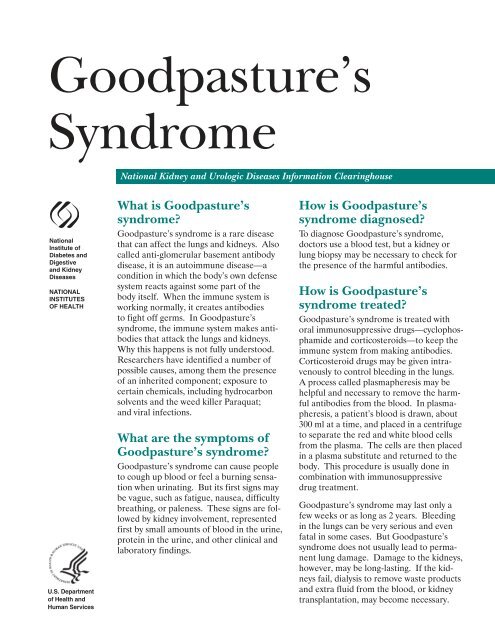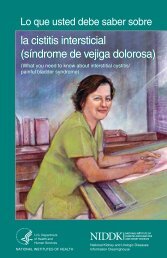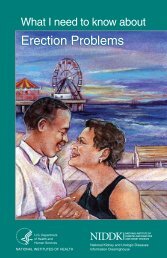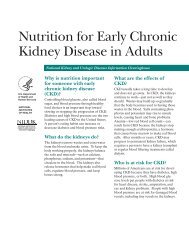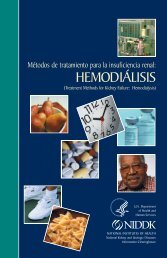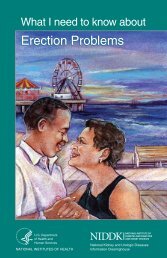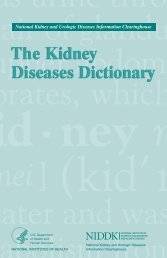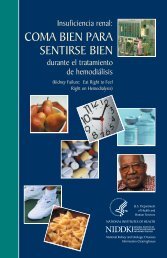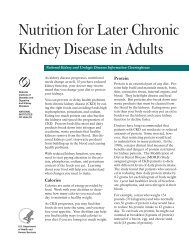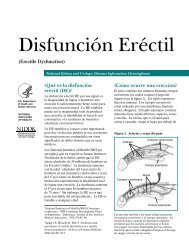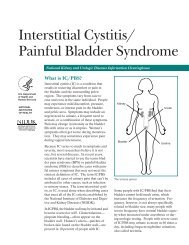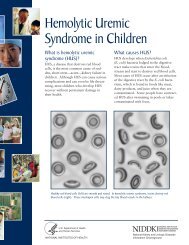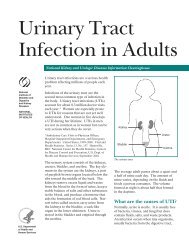Goodpasture Syndrome - National Kidney and Urologic Diseases ...
Goodpasture Syndrome - National Kidney and Urologic Diseases ...
Goodpasture Syndrome - National Kidney and Urologic Diseases ...
Create successful ePaper yourself
Turn your PDF publications into a flip-book with our unique Google optimized e-Paper software.
<strong>Goodpasture</strong>’s<br />
<strong>Syndrome</strong><br />
<strong>National</strong><br />
Institute of<br />
Diabetes <strong>and</strong><br />
Digestive<br />
<strong>and</strong> <strong>Kidney</strong><br />
<strong>Diseases</strong><br />
NATIONAL<br />
INSTITUTES<br />
OF HEALTH<br />
U.S. Department<br />
of Health <strong>and</strong><br />
Human Services<br />
<strong>National</strong> <strong>Kidney</strong> <strong>and</strong> <strong>Urologic</strong> <strong>Diseases</strong> Information Clearinghouse<br />
What is <strong>Goodpasture</strong>’s<br />
syndrome?<br />
<strong>Goodpasture</strong>’s syndrome is a rare disease<br />
that can affect the lungs <strong>and</strong> kidneys. Also<br />
called anti-glomerular basement antibody<br />
disease, it is an autoimmune disease—a<br />
condition in which the body’s own defense<br />
system reacts against some part of the<br />
body itself. When the immune system is<br />
working normally, it creates antibodies<br />
to fight off germs. In <strong>Goodpasture</strong>’s<br />
syndrome, the immune system makes antibodies<br />
that attack the lungs <strong>and</strong> kidneys.<br />
Why this happens is not fully understood.<br />
Researchers have identified a number of<br />
possible causes, among them the presence<br />
of an inherited component; exposure to<br />
certain chemicals, including hydrocarbon<br />
solvents <strong>and</strong> the weed killer Paraquat;<br />
<strong>and</strong> viral infections.<br />
What are the symptoms of<br />
<strong>Goodpasture</strong>’s syndrome?<br />
<strong>Goodpasture</strong>’s syndrome can cause people<br />
to cough up blood or feel a burning sensation<br />
when urinating. But its first signs may<br />
be vague, such as fatigue, nausea, difficulty<br />
breathing, or paleness. These signs are followed<br />
by kidney involvement, represented<br />
first by small amounts of blood in the urine,<br />
protein in the urine, <strong>and</strong> other clinical <strong>and</strong><br />
laboratory findings.<br />
How is <strong>Goodpasture</strong>’s<br />
syndrome diagnosed?<br />
To diagnose <strong>Goodpasture</strong>’s syndrome,<br />
doctors use a blood test, but a kidney or<br />
lung biopsy may be necessary to check for<br />
the presence of the harmful antibodies.<br />
How is <strong>Goodpasture</strong>’s<br />
syndrome treated?<br />
<strong>Goodpasture</strong>’s syndrome is treated with<br />
oral immunosuppressive drugs—cyclophosphamide<br />
<strong>and</strong> corticosteroids—to keep the<br />
immune system from making antibodies.<br />
Corticosteroid drugs may be given intravenously<br />
to control bleeding in the lungs.<br />
A process called plasmapheresis may be<br />
helpful <strong>and</strong> necessary to remove the harmful<br />
antibodies from the blood. In plasmapheresis,<br />
a patient’s blood is drawn, about<br />
300 ml at a time, <strong>and</strong> placed in a centrifuge<br />
to separate the red <strong>and</strong> white blood cells<br />
from the plasma. The cells are then placed<br />
in a plasma substitute <strong>and</strong> returned to the<br />
body. This procedure is usually done in<br />
combination with immunosuppressive<br />
drug treatment.<br />
<strong>Goodpasture</strong>’s syndrome may last only a<br />
few weeks or as long as 2 years. Bleeding<br />
in the lungs can be very serious <strong>and</strong> even<br />
fatal in some cases. But <strong>Goodpasture</strong>’s<br />
syndrome does not usually lead to permanent<br />
lung damage. Damage to the kidneys,<br />
however, may be long-lasting. If the kidneys<br />
fail, dialysis to remove waste products<br />
<strong>and</strong> extra fluid from the blood, or kidney<br />
transplantation, may become necessary.
For More Information<br />
American <strong>Kidney</strong> Fund<br />
6110 Executive Boulevard, Suite 1010<br />
Rockville, MD 20852<br />
Phone: 1–800–638–8299<br />
Email: helpline@kidneyfund.org<br />
Internet: www.kidneyfund.org<br />
<strong>National</strong> <strong>Kidney</strong> Foundation, Inc.<br />
30 East 33rd Street<br />
New York, NY 10016<br />
Phone: 1–800–622–9010 or 212–889–2210<br />
Internet: www.kidney.org<br />
You may also find additional information<br />
about this topic by visiting MedlinePlus at<br />
www.medlineplus.gov.<br />
<strong>National</strong> <strong>Kidney</strong> <strong>and</strong><br />
<strong>Urologic</strong> <strong>Diseases</strong><br />
Information Clearinghouse<br />
3 Information Way<br />
Bethesda, MD 20892–3580<br />
Phone: 1–800–891–5390<br />
Fax: 703–738–4929<br />
Email: nkudic@info.niddk.nih.gov<br />
Internet: www.kidney.niddk.nih.gov<br />
The <strong>National</strong> <strong>Kidney</strong> <strong>and</strong> <strong>Urologic</strong> <strong>Diseases</strong><br />
Information Clearinghouse (NKUDIC) is a<br />
service of the <strong>National</strong> Institute of Diabetes<br />
<strong>and</strong> Digestive <strong>and</strong> <strong>Kidney</strong> <strong>Diseases</strong> (NIDDK).<br />
The NIDDK is part of the <strong>National</strong> Institutes<br />
of Health of the U.S. Department of Health<br />
<strong>and</strong> Human Services. Established in 1987,<br />
the Clearinghouse provides information about<br />
diseases of the kidneys <strong>and</strong> urologic system to<br />
people with kidney <strong>and</strong> urologic disorders <strong>and</strong><br />
to their families, health care professionals, <strong>and</strong><br />
the public. The NKUDIC answers inquiries,<br />
develops <strong>and</strong> distributes publications, <strong>and</strong><br />
works closely with professional <strong>and</strong> patient<br />
organi zations <strong>and</strong> Government agencies to<br />
coordi nate resources about kidney <strong>and</strong> urologic<br />
diseases.<br />
Publications produced by the Clearinghouse are<br />
carefully reviewed by both NIDDK scientists<br />
<strong>and</strong> outside experts.<br />
This publication is not copyrighted. The<br />
Clearinghouse encourages users of this fact<br />
sheet to duplicate <strong>and</strong> distribute as many<br />
copies as desired.<br />
This fact sheet is also available at<br />
www.kidney.niddk.nih.gov.<br />
U.S. DEPARTMENT OF HEALTH<br />
AND HUMAN SERVICES<br />
<strong>National</strong> Institutes of Health<br />
NIH Publication No. 07–4558<br />
April 2007


